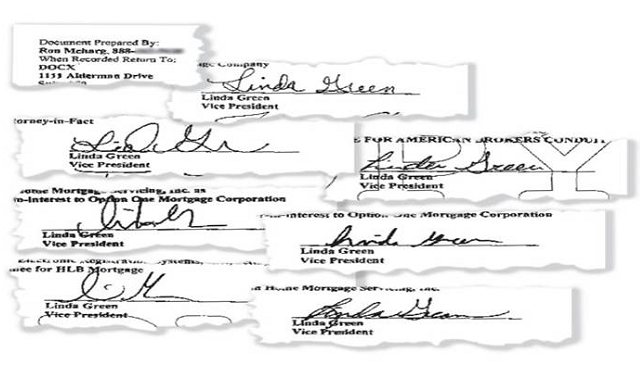
“Forgery is supposed to be a criminal offence,” says Stan Buell, of the Small Investor Protection Association. “But you could count on the fingers of one hand the people who have been charged criminally or sent to jail. It doesn’t happen.”
~
Document Forgery in Financial Industry More Common Than You’d Think, Past Employees Say
Employees in Canada’s financial industry are speaking out about falsifying documents, telling Go Public that potentially criminal acts — like forging and photocopying customer signatures, adding initials to blank documents and using Wite-Out to conceal information — are more common than most people would think.
“It was easily 85 per cent of the back sales team doing it,” says a former CIBC financial services representative, who worked in several bank branches and noted that forging signatures on documents occurred at all her workplaces. CBC has agreed to conceal her identity.
‘You feel pretty awful knowing that you could have caused some serious harm to [customers] all in the name of profit for a bank.’ – Former CIBC employee
The former employee, who left the bank last spring, says when she couldn’t meet sales targets, her manager told her to forge customers’ initials so it appeared that they had agreed to purchase insurance when they applied for a credit card, then cancel it a week or so later.
She also says a financial adviser who handled wealthy clients asked her almost two dozen times to forge customer signatures for insurance on loans, telling her his clients would never notice extra charges.
She says she finally quit because of stress and growing remorse.
“You feel pretty awful knowing that you could have caused some serious harm to them [customers] all in the name of profit for a bank.”
Rest here…
~

So is anyone actually surprised by the information in this story??v
I know I am only quite frankly SHOCKED it was published. I guess because it comes out of Canada.
Direct written quote from Obama White House Staff member.
“Yeah that’s been a huge issue w the Obama administration, it seems they’ve been willing to look the other way in the interest in restoring the “credibility” of the US financial sector”
An American bank member of the federal reserve bank forged checks on my account. Not even a check number. Obviously not my handwriting. Obviously not even a valid financial instrument any longer as one cash date on the back of the check is October 19 2009 and the second is October 16 2010 over a year apart.
This same bank falsified statements in a civil trial.
Forging checks
Moving money from one financial institution to another on a phone call without the account holders knowledge or approval
Falsifying account statements
Lying in writing to federal senator
Falsifying evidence supplied to fed bank
Denying access to loan accounts by borrower for over 3 years
Manufacturing evidence in civil trial
Stealing payments made to loans for use on lender placed insurance over insuring loans 3.6 MILLION Dollars
Especially considering bank violated banking laws by not even having a blanket insurance policy in place and no where to send the payments in place for over 9 months.
FBI acknowledged yes check was forged, yet the FBI was triaging cases so they couldn’t investigate. Yet they waste billions of our tax dollars ‘investigating’ politicians they already know ahead of time they have zero intention of prosecuting.
Lawyer for borrower goes to work for bank law firm six weeks after coercing client into signing a mediated agreement which then was nothing like what she had actually agreed to.
Borrow also discovers well after being forced into signing this agreement that the mediator also holds a partnership in the banks Lawfirm!
The only thing about this story is that someone had the balls to tell it. Certainly it will md we be disclosed to the American Middle Class.
Oh yes and let’s not forget to add. Retired FBI agent was a whistleblower while at the FBI. 29 years white collar crimes agent. Whistleblowing about??????
The FBI white collar crimes agents are systematically, intentionally being told not to investigate the felonies banks were committing reported by the American Public to the FBI. Told to tell them civil matter!
This article is so true. You learn a lot keeping up with the fraud of the big banks. Here is another one, when school loans get passed on to lawyers to collect. When the afidavit hits the court room to show the original debt? 70% of the time its accompanied by fake squiggles as signatures and no seal on notaries ??? Many times the judge accepts them then they can go back to sleep or get to their lunch date on time :/ I had a good judge who asked the collection agency to produce a human that the signature and the notary signature belonged to.Gave then 20 minutes…Their lawyers tried to feed the Judge that everybody in the industry does this and manufactures fake affidavits to pressure people into paying…JUDGE DIDNT BUY IT!!!!!! He flipped,” You bring fraud into Myyyy court room ?? ” BANG!!!! a fair deal was made.